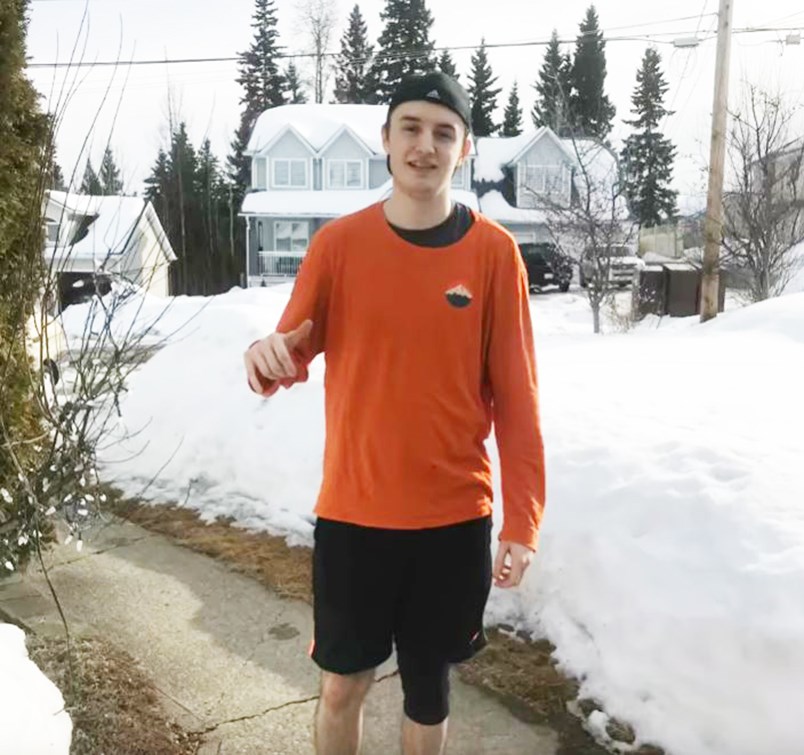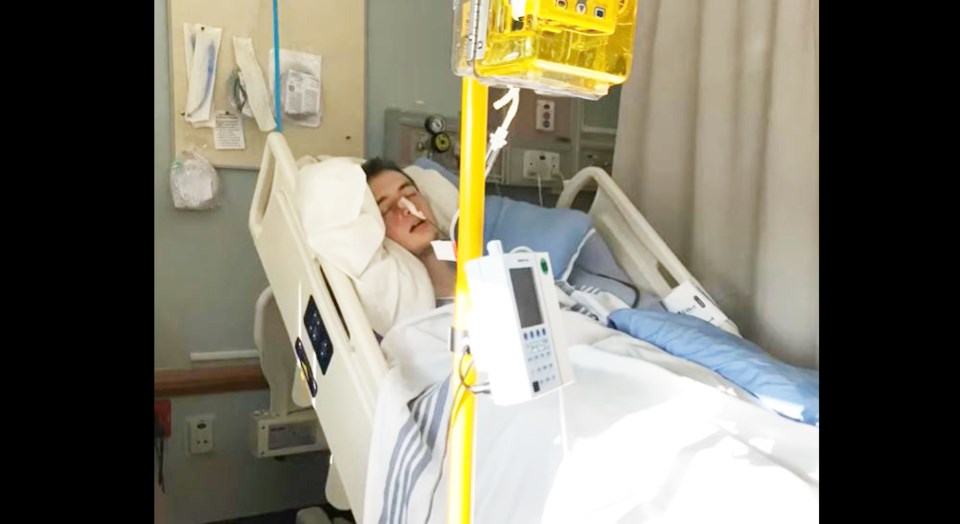Tate Murrell didn't let a major car crash stop him from achieving his lifelong goal.
Murrell had the goal of running 12 marathons, once a month, to raise awareness for mental health as running was an outlet for him and his struggles.
"I started running because my family struggles with mental health and I have my own mental health problems," he said.
"I decided when I was 20, so two years ago, that I wanted to run just to help my lifestyle and held study."
Murrell was in the paramedic's course at the time.
"I knew it [running] helped me study," he added, "I wasn't really proud of anything I did before. I wanted to feel good about doing something. At the time, I wasn't too happy about myself. I was just in a dark place. I decided I was going to eat better, sleep better and then maybe start running."
He ran his first marathon (which he runs on his own, not organized races) in January 2019, which gave him an idea after he completed one that would turn into many.
"After that marathon in January, I was like 'maybe I should try doing 12,' so a marathon a month for mental health and that's how it started," he added.
But, a severe car accident on Aug. 9 put things into perspective for Murrell after he suffered complicating injuries. He'd done seven marathons to date.
He was camping with friends in Enderby. They'd just gone hiking and they were driving back to their campsite when a serious accident happened.
The driver of his car had fallen asleep at the wheel, which resulted in a head-on collision with another vehicle.
"The funny thing about that is I was just in a paramedics course so I was almost expecting the questions that were going to be asked [by paramedics] because I'd just done a year of simulations in the classroom," he said. "So I was prepared for some of the questions that would be asked on the scene."
Murrell says he was essentially self-assessing himself once he realized he was laying on the concrete trying to figure out what had happened.
"I was trying to remain in the best position to maintain my blood pressure," he said.
The injuries from the accident were extensive and required a four-hour operation. He would have to stay in hospital in Kamloops for a month.
Murrell's injuries were in the abdominal area because of the lap seatbelt, which he says essentially cut him in half in the backseat.
"In the four-hour surgery, they had to remove four parts of my large intestine," he explained. "One part of my small intestine, my appendix. The large intestine was pretty much my whole right side."
The other piece came from his left intestine. His L2 vertebrae is compressed by 40 per cent as a result of the accident while he also broke his sternum. His lungs also contained blood.
"It was pretty nasty," he said. "It was a pretty nasty accident."
 Tate Murrell finished his goal of a marathon a month for mental health despite a terrifying car accident. (via screenshot)
Tate Murrell finished his goal of a marathon a month for mental health despite a terrifying car accident. (via screenshot) He braced himself when he realized that the car was going to crash since he saw it coming and he also didn't have airbags. Nobody died as a result of the accident.
After essentially learning to walk again in Kamloops, Tate Murrell came back home to Prince George, but would soon be back in the hospital.
"I was only home for about five days before I had to go back into Prince George hospital," he said.
"From the first surgery, scar tissue formed and it closed up my small intestine so I had a bowel obstruction from the scar tissue."
Murrell ended up in the hospital here for another month and lost 35 pounds between the two hospital stays.
He still isn't completely recovered from the accident but he still ended up doing his marathons, even though it was extremely grueling for him because he couldn't do them the way he was before the accident.
"When people see I did the marathons and I finished them, they think I'm running them," he said. "But I can't really run anymore. I just slow jog and fast walk kind of thing but I make sure I do the distance [of a marathon]."
He could do a marathon distance run in roughly four hours before the injuries. If he fast walks now, he can usually finish those in five to five-and-a-half hours. His fastest ever was under four hours.
"I was actually really impressed after the accident, I was able to do three in under six hours," Murrell added.
"When I did my last one Dec. 17 [2019], my knee gave out and started locking a bunch so I just had to hop for the second last one and then I just wrapped up my knee for the last one and I just didn't really move my knee."
Murrell finished all 12 for mental health. He had to do three in December to make it to 12 because of his injuries.
"The whole idea around it is if you're struggling with mental health, it's always hard to make people understand," he explained. "It's hard to describe the feelings, all of your feelings. Everyone's different. And I found my way to cope with it was running."
The thought of losing what he used to cope terrified him when the car accident happened.
"I was scared I wasn't going to walk again," he said. "I was so happy I could wiggle my toes and move my legs because I knew at that point I would be able to know how to walk and once I was able to walk, all I needed to do at that point was the recovery and changing the form."
"A lot of people see the physical injuries," Murrell added. "All of the trauma my body went through during the accident but my main message out there is that nobody sees the mental injuries, what's going on inside a person and I think that is more of a mountain to climb than the physical."
It's extremely hard for Murrell to get into cars now because of the memories of the horrid accident he was in.
He says it triggers him to the point where once cars hit a certain speed, his heart will begin to race and he feels a knot in his throat.
"At the end of the day, you just have to make peace with it," he said. "Peace with yourself and peace with your mind."

.jpg;w=120;h=80;mode=crop)

